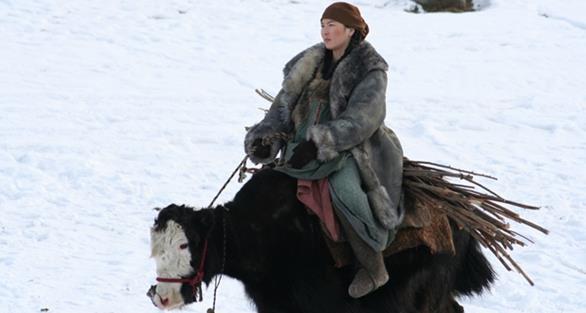Kelin (Ermek Tursunov, 2009): Kazakhstan
Reviewed by Nicholas Berquist. Viewed at the Santa Barbara International Film Festival.

When a film can elicit an entire range of emotions from an audience, more often than not it is the sign of a good film. When a film does this without the use of dialogue, someone should be prepared to hand out some accolades. Ermek Tursunov does the unthinkable in his directorial debut, Kelin. He sacrifices the dialogue for compelling images will pique your interest for the entire 82-minute duration.
Tursunov, being both writer and director, tells the tale of a young village woman torn between two suitors. Taking place in 2nd century Kazakhstan, Kelin’s future is in the hands of her father who will give here to the man with the most wealth regardless of her personal feelings. This decision then perpetuates the inciting incident as Kelin’s true lover (the lesser of the suitors) makes a blood oath to return and take Kelin as his wife. With no other witnesses, Kelin does her best to keep the evidence of the oath hidden as it has left a scar on her forearm. She leaves her father to begin her new life. Her husband is a family man, supporting his brother and shamanistic mother and Kelin soon develops feelings for him. She longs for her true lover but must find a way to live in peace or else pay the price of betrayal.
While the story may seem a bit typical, keep in mind it is a directorial debut. But what makes this film special is the absence of dialogue. This film is a perfect example of showing, not telling. Rather than relying on speaking, Tursunov lets the camera, landscape, and lighting to reinforce the actions of the characters. For instance, Tursunov utilizes a crane to encompass the majestic landscape of the Altai Mountains. We immediately get a sense for the bleak, lonely world these people live in. There wont be any police or any form of help for that matter. These people are truly on their own living by their own laws.
The feministic nature of the film is also a breath of fresh air. One would typically think that in nomadic tribes the men would be the center of the family. While on the surface this may be true as we see the men collecting firewood, milking the yaks, and hunting. When Kelin’s husband suffers a fatal wound the feministic theme begins to take over. Without women there cannot be new life, and without the shaman women the death rituals will not be completed. Therefore, Tursunov is opening our eyes to an idea that perhaps wasn’t thought of before.
Even without speaking this film has the ability to keep you interested. There are fighting scenes, funny scenes, and even tragic scenes. Perhaps one flaw is the characters do have a tendency to seem distant without the use of language, but this is helped by the lighting and musical score. Tursunov also keeps a strong sense of reality through the editing. There are no tacky wipes, fades, or dissolves. Instead he uses the wildlife in the landscape to symbolize passages of time. This film will likely not satisfy everyone, but if I may, I implore you to seize the moment and watch this film. Who knows, maybe this is a once in a lifetime opportunity.
About this entry
You’re currently reading “Kelin (Ermek Tursunov, 2009): Kazakhstan,” an entry on Student Film Reviews
- Published:
- 02.09.10 / 10am
- Category:
- Films, Santa Barbara Film Festival 2010
2 Comments
Jump to comment form | comments rss [?] | trackback uri [?]